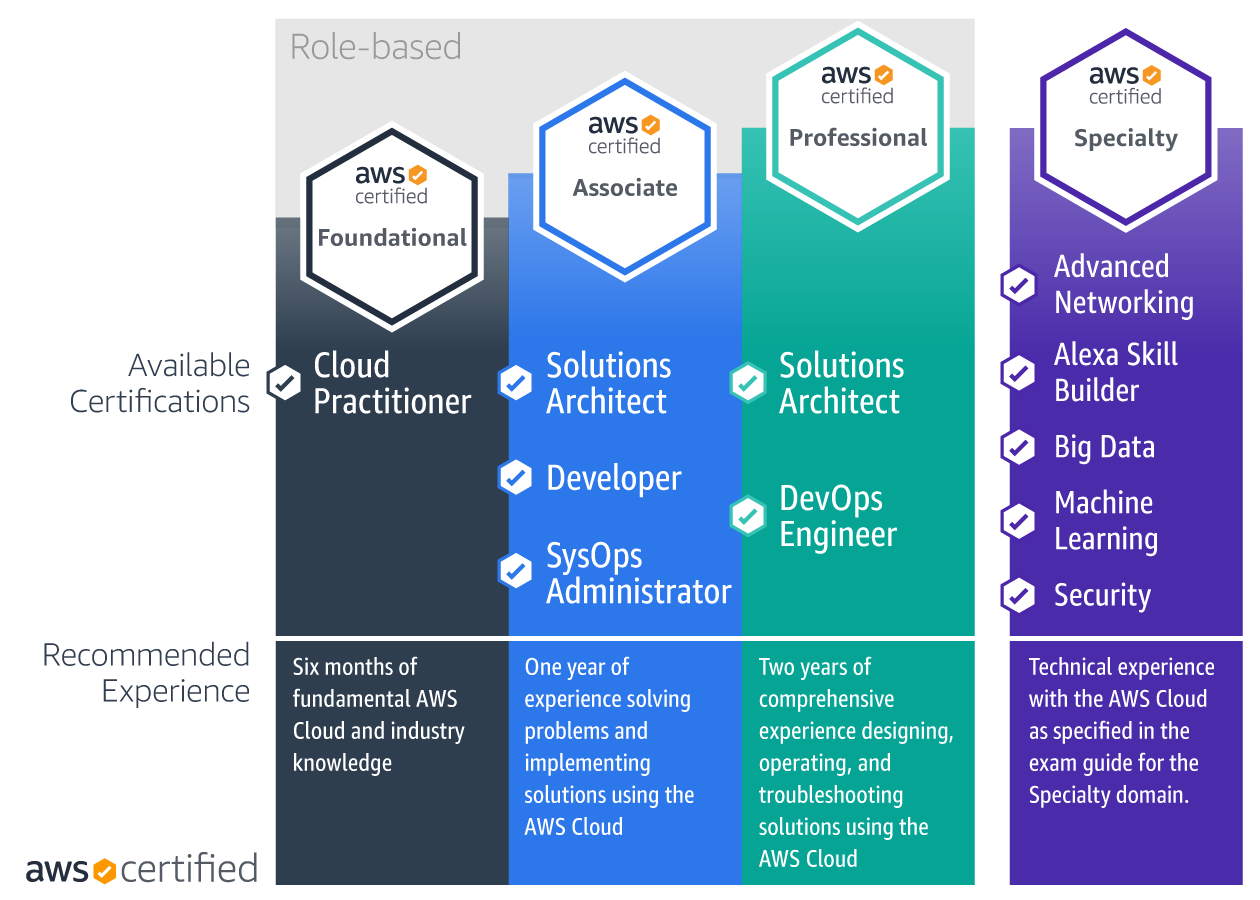Published:
Cloud Computing and AWS Learning Journey
- Cloud Computing
- AWS Certification Overview
- Learning Paths
- Frequently Asked Questions
- My AWS Certifications Journey
Cloud Computing
Welcome, it may be a good idea to get familiar with cloud computing, if needed.
Please look at below resources to learn more about:
- What is Cloud Computing? Strategies and Importance for Business
- Hype Cycle for Cloud Platform Services, 2022
AWS Certification Overview
You can learn more about the different AWS certifications below:
 Image source: https://d1.awsstatic.com/training-and-certification/certification-roadmaps/Cert-Roadmap-v10.2.e6794a76d8f03b3840e69dddcde11d1749903906.png
Image source: https://d1.awsstatic.com/training-and-certification/certification-roadmaps/Cert-Roadmap-v10.2.e6794a76d8f03b3840e69dddcde11d1749903906.png
Note: The years of experience associated are just for example. It’s not a strict pre-requisite to write the exam.
Scope and depth for certificates
| Certification Type | Scope | Depth |
|---|---|---|
| Foundational | Broad | Shallow |
| Associate | Broad | Medium |
| Professional | Broad | Deep |
| Specialty | Narrow | Deep |
Learning Paths
There are two main ways in which you can choose your learning path:
• Role-based learning path
• Skills-based learning path
Role-based learning path
If you’re targeting for particular roles such as the ones given below:
• Architect
• Developer
• SysOps Engineer
• DevOps Engineer
Skills-based learning path
If you’re targeting to learn specific set of skills such as ones given below:
• Machine Learning
• Data Analytics
• Advanced Networking
• Security
• Database
• SAP
Frequently Asked Questions
Pre-requisities to take AWS certifications
All certifications are independent of each other. You take take any of them directly. However, going with incremental improvements (foundational knowledge to advanced knowledge) is recommended.
Which AWS certification should I get first?
If you are totally new to the AWS cloud, get started with the AWS Certified Cloud Practitioner.
This gives you a broad introduction to the key AWS services and helps you understand how the AWS Cloud works.
If you already have some experience with AWS, a great stepping stone towards the next level certification can be the AWS Solutions Architect Associate.
This gives a high-level overview and medium understanding of creating solutions architecting on AWS for various business needs.
For more details, please check AWS Certification FAQ.
Please check exam guides for specific certifications.
How to study and prepare?
Essential elements of trainings:
• Understanding of concepts
• Practicing the exam questions
• Recommended to do hands-on practical experience (not absolutely necessary though)
Options
AWS Trainings or AWS Skill Builder or through AWS Partner Networks (APNs)
YouTube videos
Dedicated course on Digital Cloud Training/Udemy/other online platforms
- Although one may tend to go for free options such as AWS website/APNs to learn concepts, however it’s tedious and time-consuming.
The most efficient way is to do it through a dedicated course, which is usually paid. For example, NEW Ultimate AWS Certified Cloud Practitioner - 2022 basically the content from Stephane Maarek, or the ones from Digital Cloud. These options are really worth the money you pay for.
- Irrespective of whether you buy a paid course to learn theory concepts or you learn them for free, buying “practice exams” course is really heavily recommended and the most efficient way to crack the certificate.
My AWS Certifications Journey
AWS Cloud Practitioner (AWS CCP)
I started with AWS Cloud Practitioner certificate first. I prepared on my own through Digital Cloud AWS CCP ultimate training package, and wrote the exam.
Steps of learning
• Theory: Understanding theory concepts by watching video tutorial course
• Practice: Practicing exam questions by doing practice exam course
• Hands-on: I was already working on AWS in my previous project, so did not do hands-on separately.
Time spent: about two weeks for understanding concepts, two weeks for practicing exam questions.
Certification passed: 13 Dec 2021
My recommendation
Understanding concepts:
Watch the full video course on YouTube. You may like to install a good ad-blocker, and watch the video in parts, for example 30/60 minutes in one session.
Do make notes, however not too much detailed.
Logical flow of understanding (step-by-step):
Basic Introduction: AWS Certified Cloud Practitioner Training 2020 - Full Course
Deep Dive: AWS Certified Cloud Practitioner Certification Course
Practice questions:
Get this course AWS CCP DCT Practice Exams
Logical flow of practice (step-by-step): Do questions from
- Practice Exams – Knowledge Review
- Practice Exams – Training Mode
- Practice Exams – Exam Mode
- Final exam simulator
Don’t take too much detailed notes. Do note down why some specific option is right or wrong.
AWS Solutions Architect Associate (AWS SAA)
Next, I continued with AWS Solutions Architect Associate certificate. I prepared through Digital Cloud AWS SAA ultimate training package, and wrote the exam.
Steps of learning
• Theory: Understanding concepts by watching video tutorial course
• Practice: Practicing exam questions by doing practice exam course
• Hands-on: I tried working with some but not all hands-on lessons in the course
Time spent: about six weeks for understanding concepts, two weeks for practicing exam questions.
Certification passed: 7 Dec 2022
My recommendation
- Buying a dedicated course such as the one mentioned above is a good idea for AWS SAA.
- Also, it’s recommended though not absolutely necessary to do hands-on experiments to learn by doing.
- The logical flow of practice stays same as mentioned for AWS CCP.
Reasons to do it this way
• Self-paced course: The sessions can be spread over time which is good when learning a new thing.
• Efficient: It offers 500+ practice questions to practice for a confident preparation.
• Hands-On: Opportunity to do practical hands-on exercises as well.
Helpful resources
Revision: using Mind maps
I used mind-maps to quickly revise various services.
Do a quick search for “aws cloud practitioner mind map” or “aws solutions architect associate mind map”. Look for images.
Disclaimer: I have no conflict of interest while mentioning resources for any monetary benefits.